Fitness AI Workout App Review: Is It worth It in 2023?
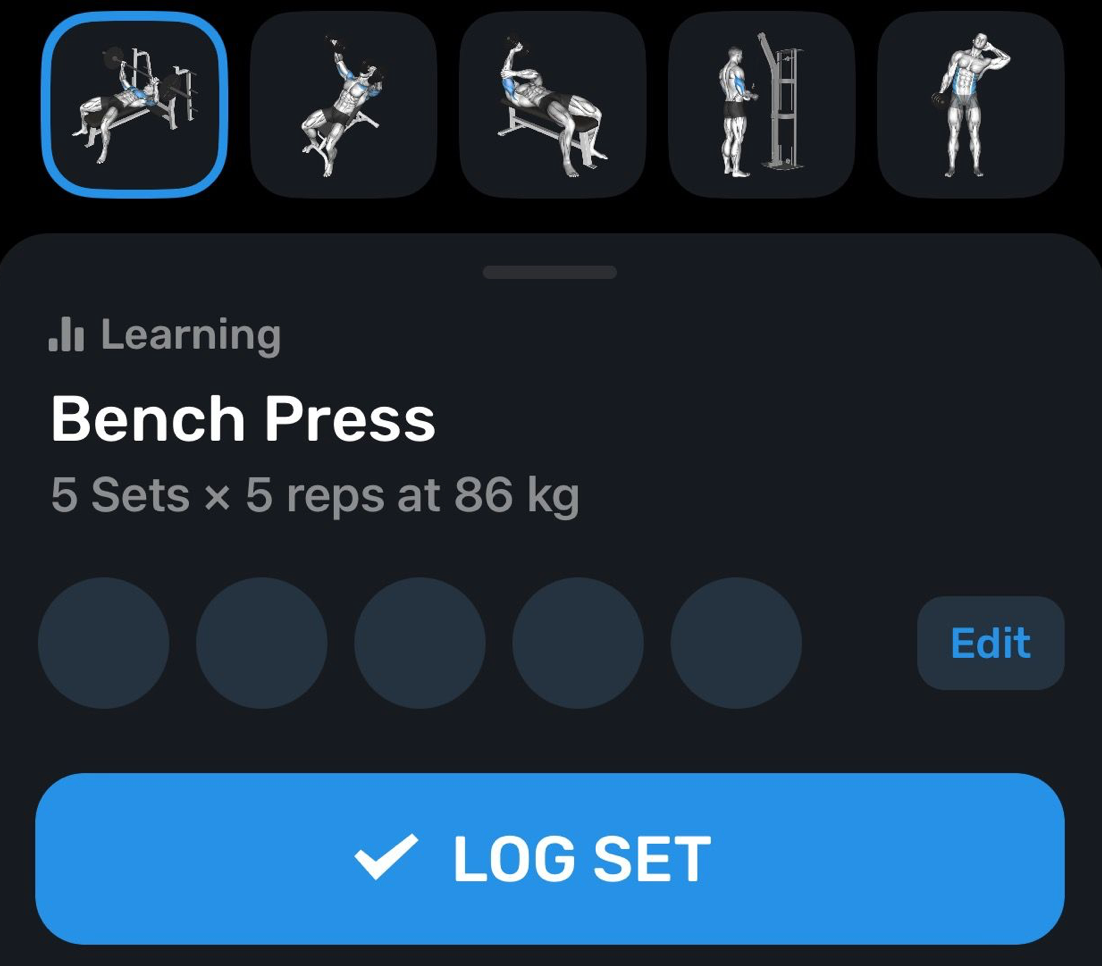
Is Fitness Ai worth it in 2023? The short answer is maybe.
With its sleek interface and ''state-of-the-art'' AI technology, fitness AI appears to be the ideal workout app for anyone seeking an app to automatize their workouts and program creation.
However, after diving into the app and testing its programs, we were disappointed to find that the programs generated by the AI are not as great as they seem.
Although the app uses progressive overload, widely used by trainers to increase muscle mass and strength, it is not sufficient for generating high-quality workout programs.
Indeed, progressive overload alone does not take into account other essential factors such as:
- Exercise selection
- Frequency
- Intensity
- Volume
- Individual differences in training response
And more.
In this review, we will take a closer look at Fitness AI and explain why its workout programs are disappointing, despite the app's promising features.
Let's explore the reasons why Fitness AI's programs may not meet your expectations.
In a nutshell
- Fitness AI is a workout app that has received numerous positive reviews despite being average at best.
- The app's workout generator may not be suitable for people who are just starting with their fitness journey or those who are looking for a personalized workout plan.
- Fitness AI creates his programs solely relying on progressive overload which is not enough to deliver long term results
- We suggest a competing app that applies important principles such as progressive overload, specificity, recovery, and individualization, making it a better choice for people looking for a comprehensive workout app.
In summary, this article has reviewed the Fitness AI workout app and provided critical insights for people looking for information before committing to a workout app. We have identified several red flags associated with the app, explained why it might not be suitable for certain users, and highlighted the importance of following fundamental workout principles. We have also introduced a better alternative to Fitness AI, detailing its unique features and benefits. By reading this article, readers will have a better understanding of the pros and cons of these two workout apps, and be better equipped to make an informed decision based on their fitness goals and needs.
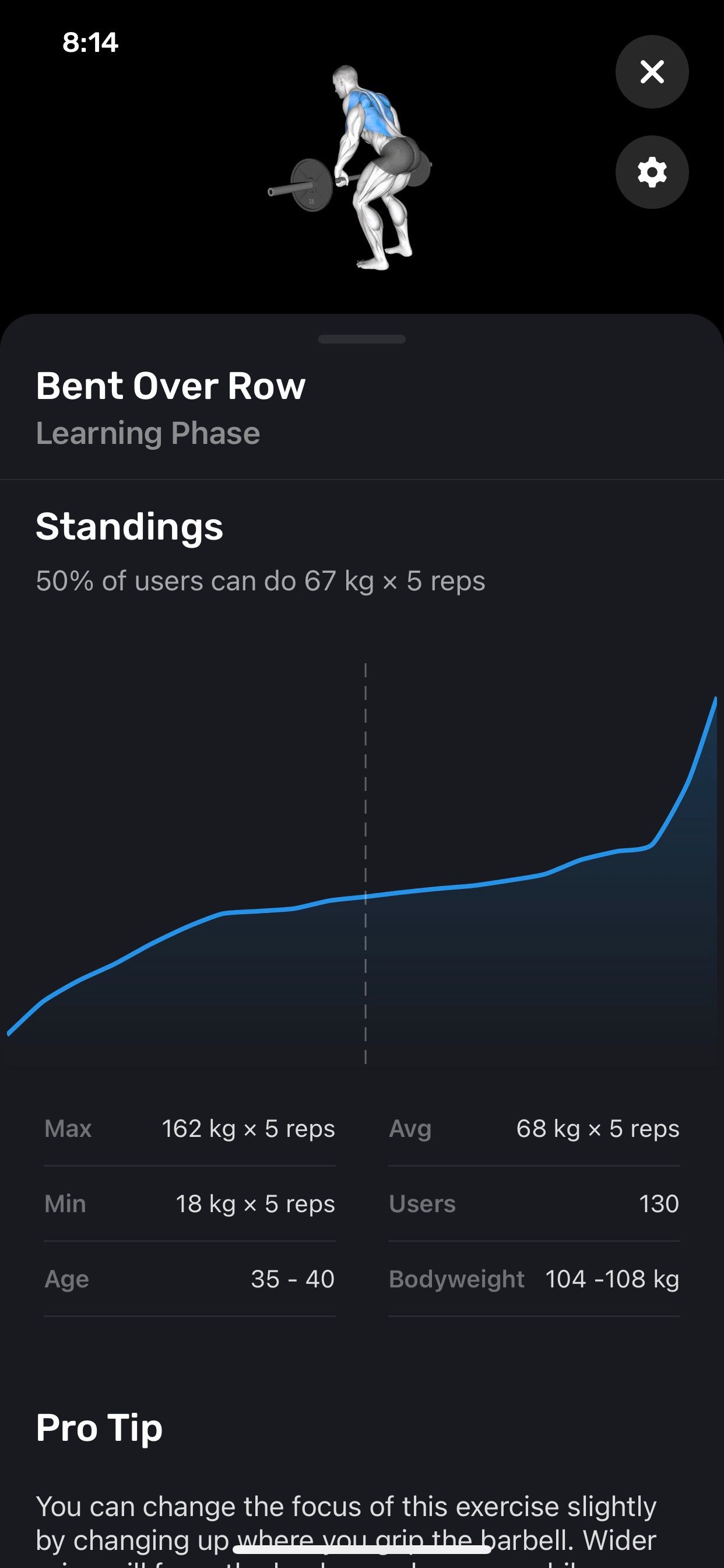
Fitnes AI Score
Program's Efficacy: 3.2/5
The Fitness AI workout app has been designed with the aim of providing a personalized workout plan for its users, leveraging AI technologies. However, the AI design seems to fall short of its intended purpose. Users have the ability to modify parameters, which is a positive aspect in terms of customization, but it can potentially undermine the effectiveness of the program as there are no safeguards against unbalanced or harmful modifications. Furthermore, the AI often recommends workouts that don't match the fitness levels or specific goals of the users. This discrepancy seems to be a result of poor calibration in the AI algorithms which tend to oversimplify complex fitness dynamics, leading to the score of 3.2 out of 5.
User Interface: 4.8/5
The user interface is one of the shining points of the Fitness AI app. The design is sleek, intuitive, and user-friendly, with clear navigation and easy-to-follow workout diagrams. It’s clear the company has invested heavily in ensuring that the app's UI is top-tier, providing a smooth and enjoyable user interaction experience. The application also incorporates vivid, engaging graphics and a clean, streamlined layout. These elements make the application stand out among its competitors, earning it a commendable score of 4.8 out of 5.
Value: 2/5
Despite its sleek interface, the value proposition of the Fitness AI app is rather questionable. While the app does offer a unique approach to workout programs with its AI-driven design, the calibration of these algorithms tends to falter after the first few weeks of use. Userscould be experiencing plateaus or even regression in their fitness progress due to the AI's inability to adapt and evolve with the users' improving fitness levels. Furthermore, the pricing model of the app, given its flawed AI design, is steep compared to the actual benefit the user receives, resulting in a value score of just 2 out of 5.
User Experience: 3/5
The overall user experience offered by the Fitness AI app is somewhat of a mixed bag. While the impressive UI design makes the initial stages of using the app a breeze, the long-term user experience is hampered by the inadequacies in the AI design. Users report that the workout plans, though visually appealing, often lack depth and fail to meet their specific needs over time. This leads to a lackluster workout experience despite the app's pleasing aesthetic design. However, using the app is better than not having a structured workout at all, and hence it scores 3 out of 5.
Fitness AI key features
The main key features of Fitness AI is its use of artificial intelligence to generate workouts. While the idea of using AI to create personalized workouts may seem innovative and appealing, it unfortunately falls short in practice in the cas of Fitness AI. As we mentioned earlier, the app's reliance on progressive overload alone is not enough to create effective workout programs.
In fact, there are many other important factors to consider when designing a workout program, such as exercise selection, volume, intensity, frequency, and rest periods. Neglecting these factors can lead to muscle imbalances, overuse injuries, and a plateau in progress.
It's a shame that such a well-organized and visually appealing app didn't give enough attention to the workout creation section. While it's understandable that the app's creators wanted to focus on incorporating the latest technology into their product, they overlooked the importance of human expertise and knowledge in creating effective workout programs. Ultimately, the AI-generated workouts provided by Fitness AI may not deliver the results that experienced bodybuilders are looking for.
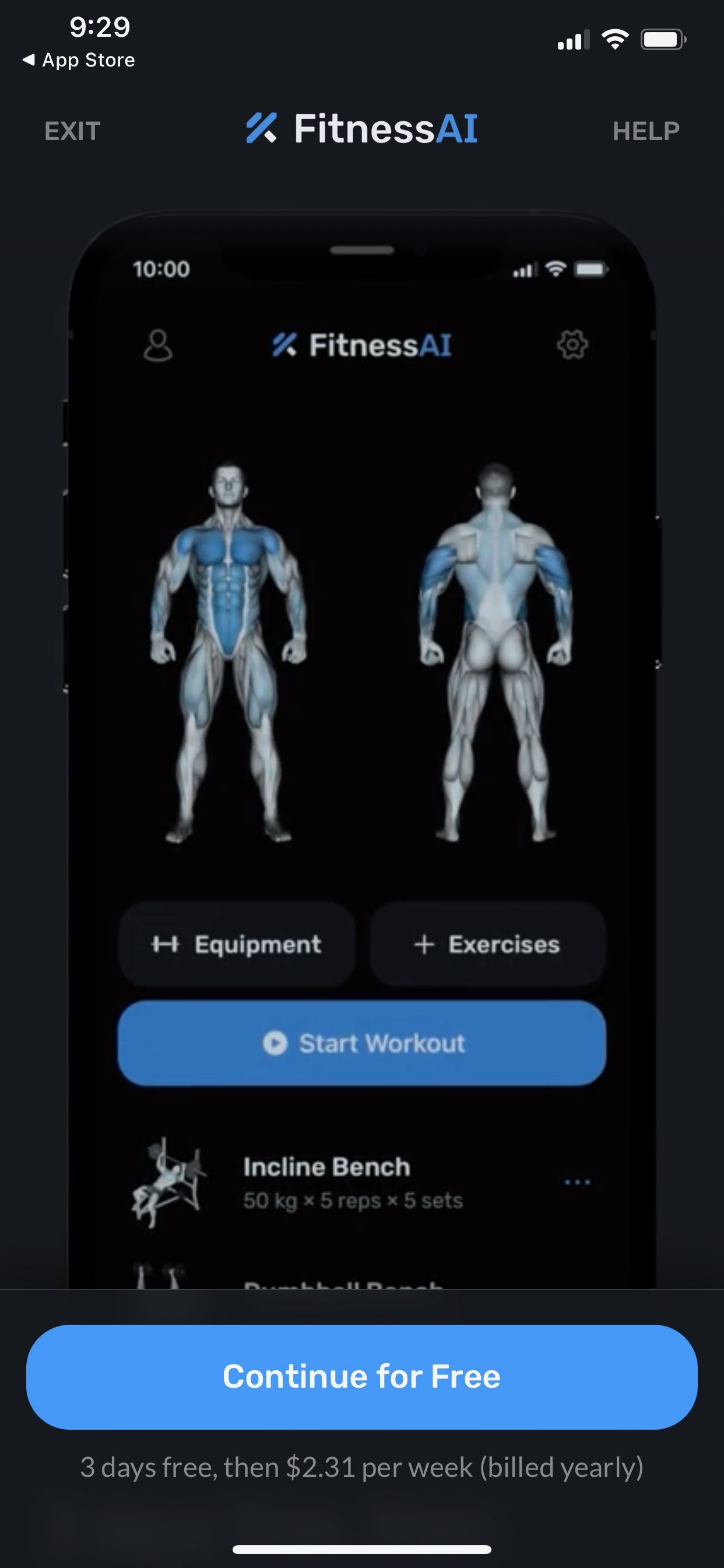
How do we rate and review product
At Dr. Muscle, we take our reviews seriously and aim to provide our readers with honest and accurate evaluations of the products we review. To accomplish this, we have a team of experts consisting of a 20-year experienced trainer who holds a Bachelor's degree in exercise science and a Ph.D. in Public Health, and a writer experienced in bodybuilding.
When reviewing a workout app, we first use the app ourselves and go through every pages to gain an understanding of how the program works and its overall effectiveness. We also take into consideration how a person with average knowledge in exercise science would progress using the app.
Furthermore, we analyze the value that the app provides for its cost, considering factors such as the variety and quality of workouts offered, as well as any additional features or benefits. Our ultimate goal is to provide an informed perspective on the various fitness apps available on the market.
It's worth noting that, as a competing app, we believe our own app is superior to Fitness AI. However, we are committed to providing honest and accurate reviews of all workout apps we evaluate, regardless of whether they are in direct competition with our own product.
First impressions using Fitness AI
As an experienced lifter, I noticed a few shortcomings in the Fitness AI app, but I can understand how a beginner or intermediate lifter might be impressed with the overall design and user experience. The app has a sleek and easy-to-use UI that makes it simple to find everything you need. It's also designed to take the work out of creating a workout, which can be very appealing for those who are new to fitness.
However, upon closer inspection, I quickly discovered that the app lacks certain features that are essential for building an effective workout routine. For example, there is no test for 1 repetition maximum (1RM), and there is no way to gauge the Reps In Reserve (RIR) for each exercise. Additionally, the exercises in the workout seemed to be placed randomly, and the overall volume was quite high, which led me to believe that the app relies solely on progressive overload to create workouts.
While the app may seem impressive at first glance, it's clear that there are some major limitations in terms of workout creation. As an experienced lifter, I believe that these limitations could hinder progress and prevent users from reaching their full potential.
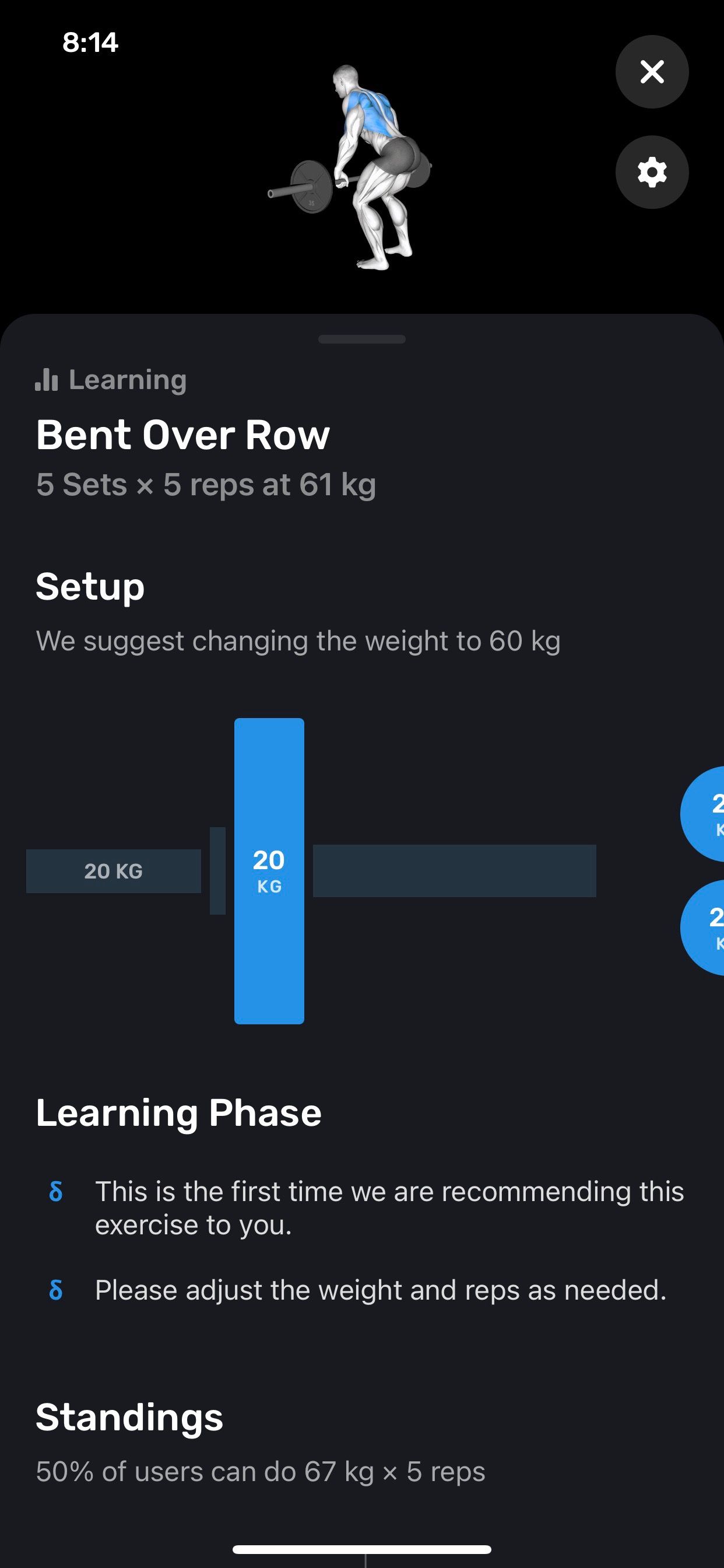
Fitness AI training program analysis
Upon further analysis of Fitness AI's training programs, it became clear that the app relies heavily on progressive overload (PO). For those unfamiliar with the term, PO is the gradual increase of stress placed on the body during training. This is often done by increasing the weight or reps of an exercise over time. While PO is an essential component of any training program, it's not enough on its own to create a comprehensive workout routine.
One major issue with the Fitness AI training programs is the lack of variation in rest times. All rest times were set static at 30 seconds, which is not suitable for all exercises in every context. Different exercises require different rest periods, and ignoring this can lead to suboptimal performance and increased risk of injury.
Another concerning aspect is the absence of a 1 repetition maximum (1RM) test. A 1RM test is used to determine the maximum amount of weight an individual can lift for one repetition of a given exercise. This information is critical for creating personalized training programs that align with the user's goals and capabilities. Without a 1RM test, the training programs generated by Fitness AI may not be tailored to the user's abilities, which could lead to ineffective workouts or even injury.
In addition to a 1RM test, another important metric that was missing from the Fitness AI training programs was Reps In Reserve (RIR). RIR is a gauge of how many reps an individual could perform before reaching muscle failure. By monitoring RIR, individuals can better understand their fatigue levels and adjust their workouts accordingly. Without RIR, users of the Fitness AI app may not be getting the most effective workouts possible.
After a deeper dive in the app I think I found how Fitness AI generate their workouts. Users can toggle some options as duration, equipment, rep range, and rest timer. There is also a Randomness option you can adjust. That is very revealing of how Fitness AI could generate a workout. It's up to you to create it
Overall, while the Fitness AI app may seem impressive at first glance, its reliance on PO and lack of essential metrics such as 1RM and RIR may limit the effectiveness of the training programs generated by the app. But the worst is really the way anyone can simply set it anyway they want. It's important to have a more precise approach to workout creation in order to achieve optimal results.
Additionally, there is a lack of personalization in the app. It seems that the program is not only static but is the same for everyone, regardless of their experience level, goals, or limitations. This one-size-fits-all approach does not work for everyone, and can even be counterproductive or harmful for some users. Overall, the lack of individualization and attention to key training principles make this app a poor choice for serious and experienced lifters.
The main problem with Fitness AI
The main issue we have with the Fitness AI app is the significant contrast between the high-quality user interface and the poor quality of the workouts it generates. It feels more like a gym log that will roughly calculate what your next weight is. While the app's easy-to-use design and layout are undoubtedly appealing to many users, the actual workout programs it creates fall short in several key areas. Specifically, the programs seem to be based solely on the principle of progressive overload, which is not enough to create a well-rounded and effective training plan.
Progressive overload is the principle that states that muscles must be subjected to increasingly higher levels of stress over time to continue to grow and develop. While progressive overloadis a fundamental principle in any weight training program, it is not enough on its own to create a comprehensive workout plan. Effective training programs need to account for factors such as exercise selection, proper volume and intensity levels, adequate rest periods, and individualized training needs. Unfortunately, Fitness AI neglect most of these crucial elements in favor of simply increasing the weight lifted each session.
Another concern is that the app discloses other users' data as a reference on how much weight one should lift. While this may seem motivating for some users, it can be dangerous for others. For example, if the app recommends a weight that is too heavy for a user based on their strength level and experience, it could result in serious injury.
Additionally, there is a lack of personalization in the app. It seems that the program is the same for everyone, regardless of their experience level, goals, or limitations. This one-size-fits-all approach may not work for everyone and can even be counterproductive or harmful for some users. While it could be a very nice gym log for experts willing to spend the time organizing a workout , the lack of individualization and attention to key training principles make this app a poor choice for serious and experienced lifters looking for a top quality program.
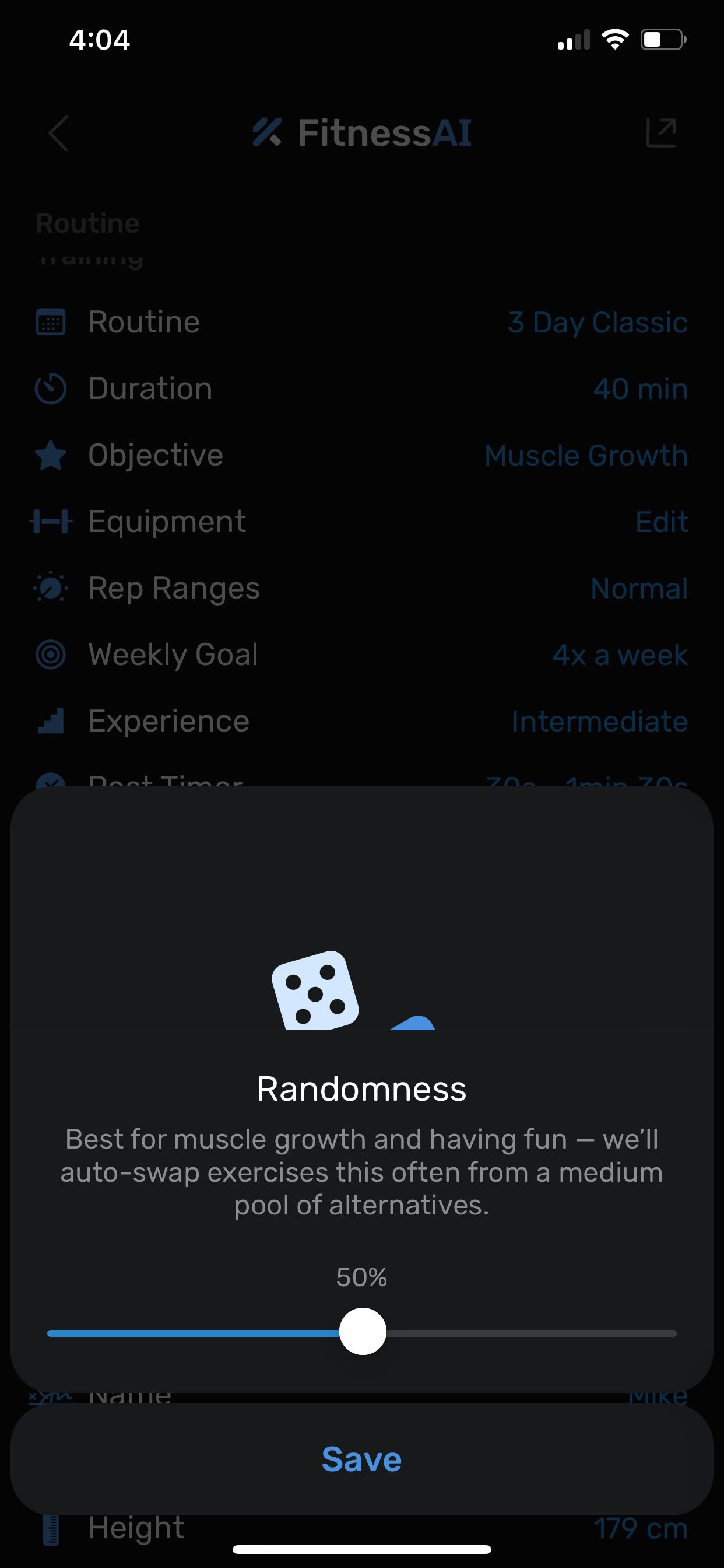
Fitness AI Cost
The pricing structure of Fitness AI appears to be somewhat fluid. Upon my initial login, the app promptly offered me an annual membership at a rate of $89. However, the listed in-app purchases on Apple's App Store indicate variability in pricing, subject to changes. At the time of drafting this review, Fitness AI's listed costs include a monthly subscription of $9.99 and an annual subscription ranging from $59.99 to $89.
Comparing Free and Paid Services
Following the termination of the 7-day free trial, Fitness AI transitions to paid service.
Fitness AI value analysis
Fitness AI claims to offer personalized workout plans, we found that these plans were not truly personalized to each user's unique fitness level and goals. As a result, users may end up following a workout plan that is not ideal for their individual needs, potentially leading to injury or slower progress towards their goals.
Additionally, the real-time feedback feature of Fitness AI is not as accurate and helpful as it could be.
Furthermore, the app feels more like a gym log than a virtual trainer, as it lacks the guidance and support that a personalized virtual trainer can provide. With a personalized virtual trainer, users can get individualized guidance and support throughout their fitness journey, which can be crucial for those who are new to working out or have specific needs or limitations.
Red flags
As we took a closer look at Fitness AI, we couldn't help but notice some red flags that raise concerns about the accuracy and effectiveness of the app. Here are three areas that stood out to us:
Red flag #1: Unrealistic starting weight mixed with a standing graph:
Fitness AI seems to have an unrealistic starting weight for new users, which is concerning for a workout app that is supposed to provide personalized plans. Additionally, the standing graph showing how many users have done how much weight is ambiguous and potentially misleading.
Red flag #2 2: App Store listing boasting about "out-performing" human personal trainers:
According to Fitness AI's App Store listing, their innovative algorithm out-performs any human personal trainer or fitness coach at the gym. This claim raises questions about how their workouts are actually calculated and whether they are tailored to individual users.
Red flag #3: The toggle option menu
The toggle option menu seems to be the base of the creation of the workouts, which means that the app may rely too heavily on user pre-determined settings rather than individualized plans. This will lead to less effective workouts for users who have no clue how to create a workout. The Randomness option was really a surprise for us to see how the workouts could be created, it really shows the poor understanding of exercise science the development team behind this app.
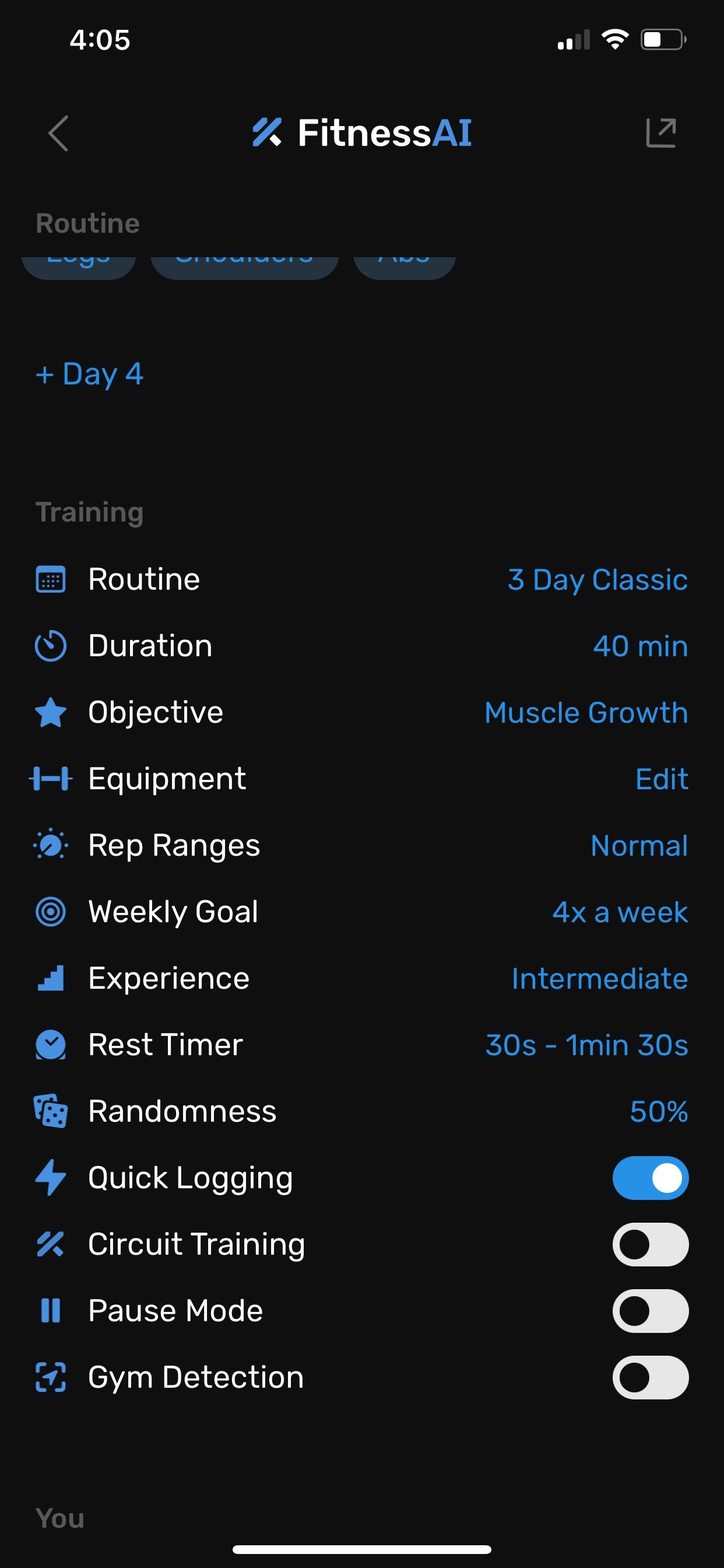
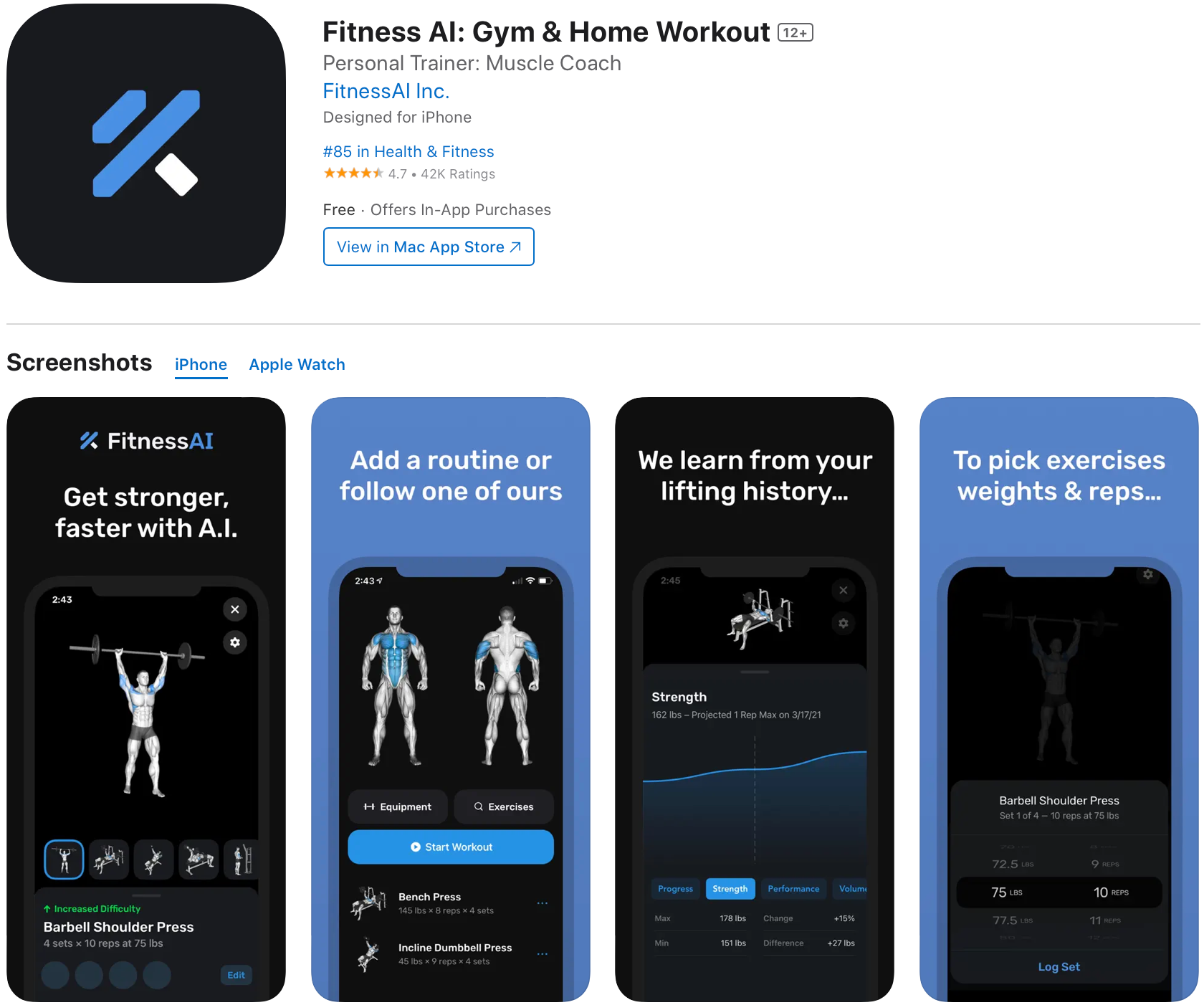
Despite being average, why does Fitness AI receive numerous good reviews?
It's not uncommon for an app that is average or even bad to receive numerous good reviews. This can be due to various factors, including app developers' strategies to acquire positive reviews.
Large budget development companies often spend a lot of money on ads to attract new users. These users may give positive reviews after only a few hours of using the app, regardless of its actual effectiveness. In some cases, these users may not be competent at evaluating workout plans or may have unrealistic expectations, leading them to leave positive reviews even if the app doesn't meet their needs.
It's important for users to take reviews with a grain of salt and consider that the tool you are about to use could make the difference between success and failure
Reviews from the app store
To get a better sense of Fitness AI's actual effectiveness, we took a closer look at reviews from the App Store. Here are some of the comments we found that shed light on the app's strengths and weaknesses.
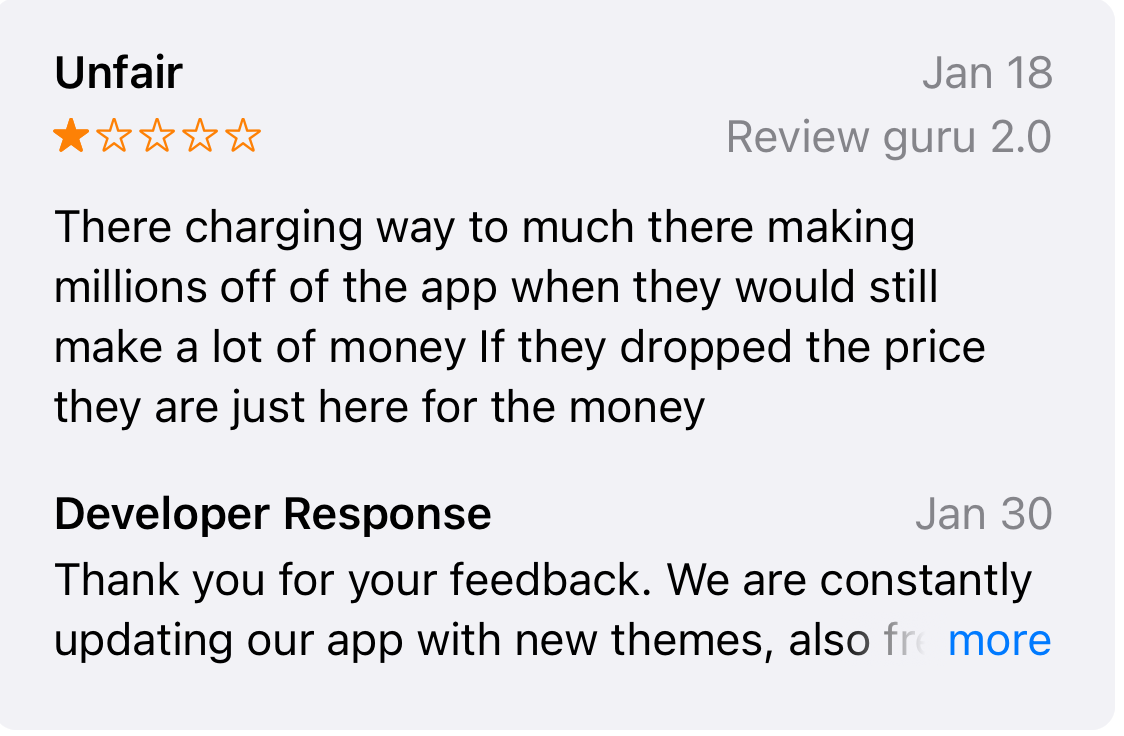
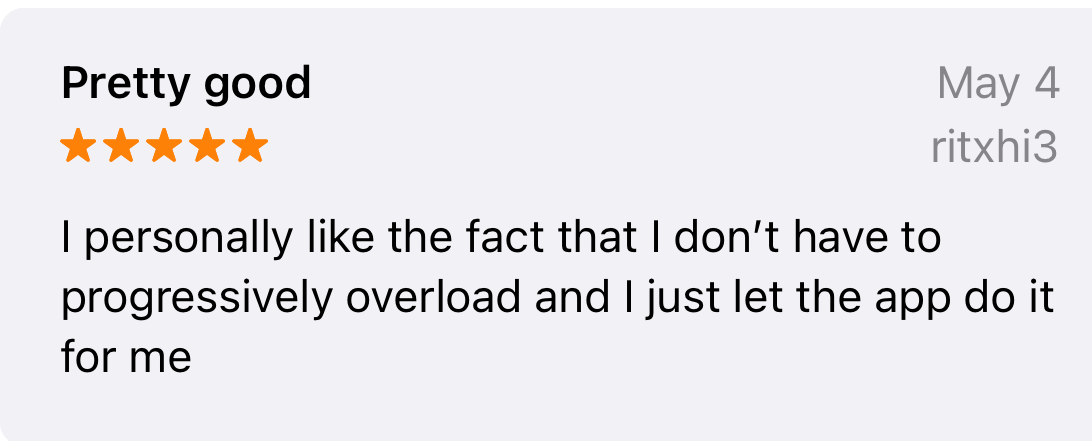
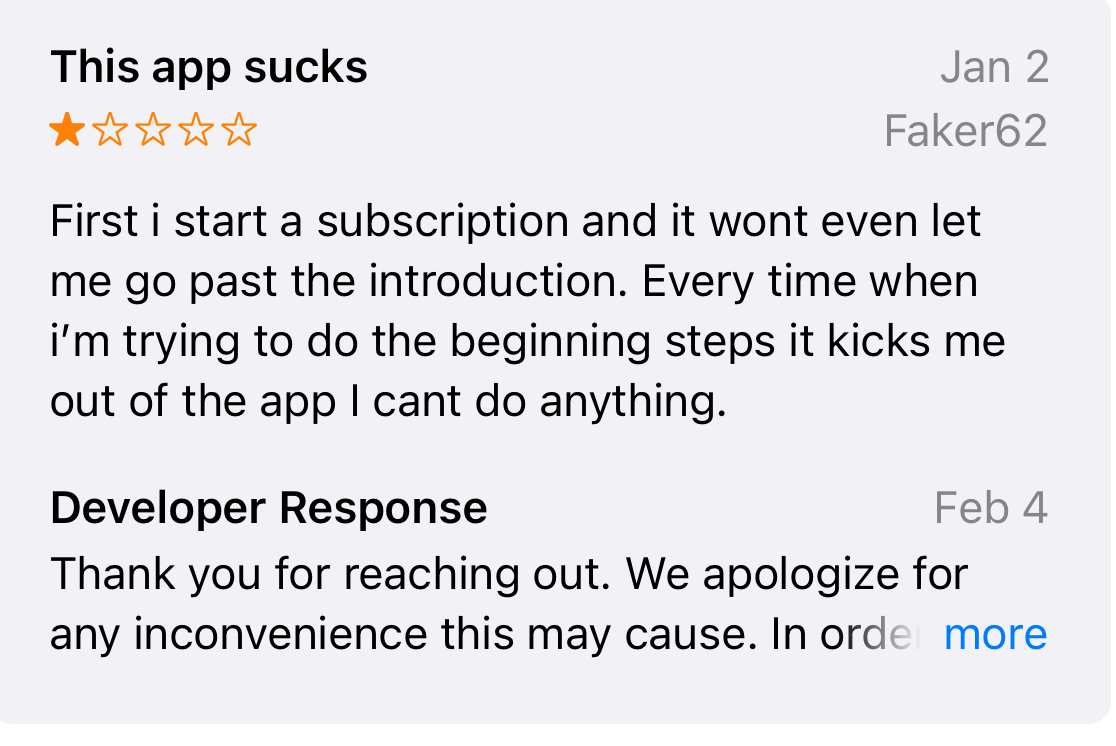
Fitness AI real user review
In addition to App Store reviews, we also scoured social media to find real user comments about Fitness AI. Here are some of the comments we found that provide insights into the app's strengths and weaknesses
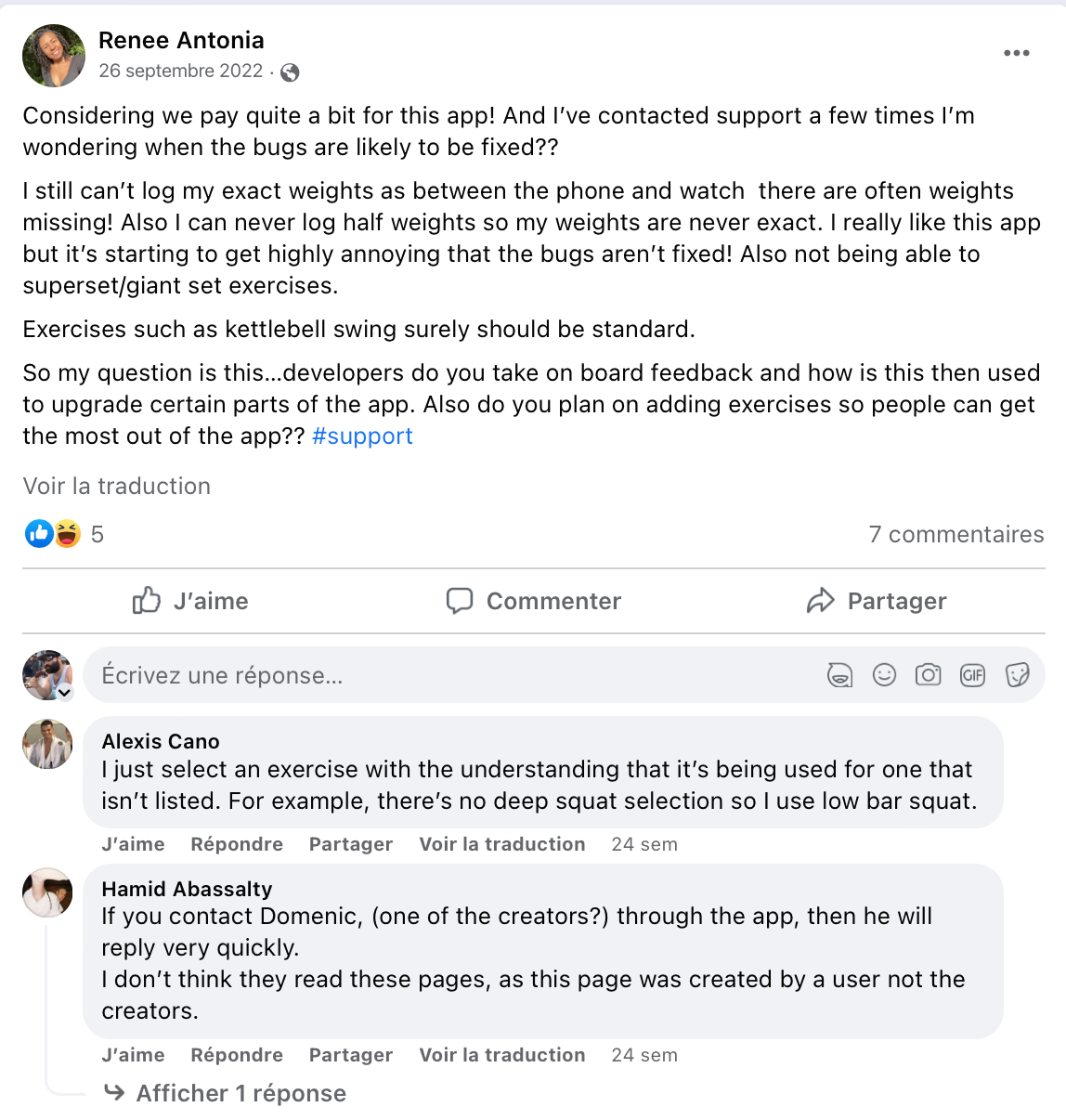
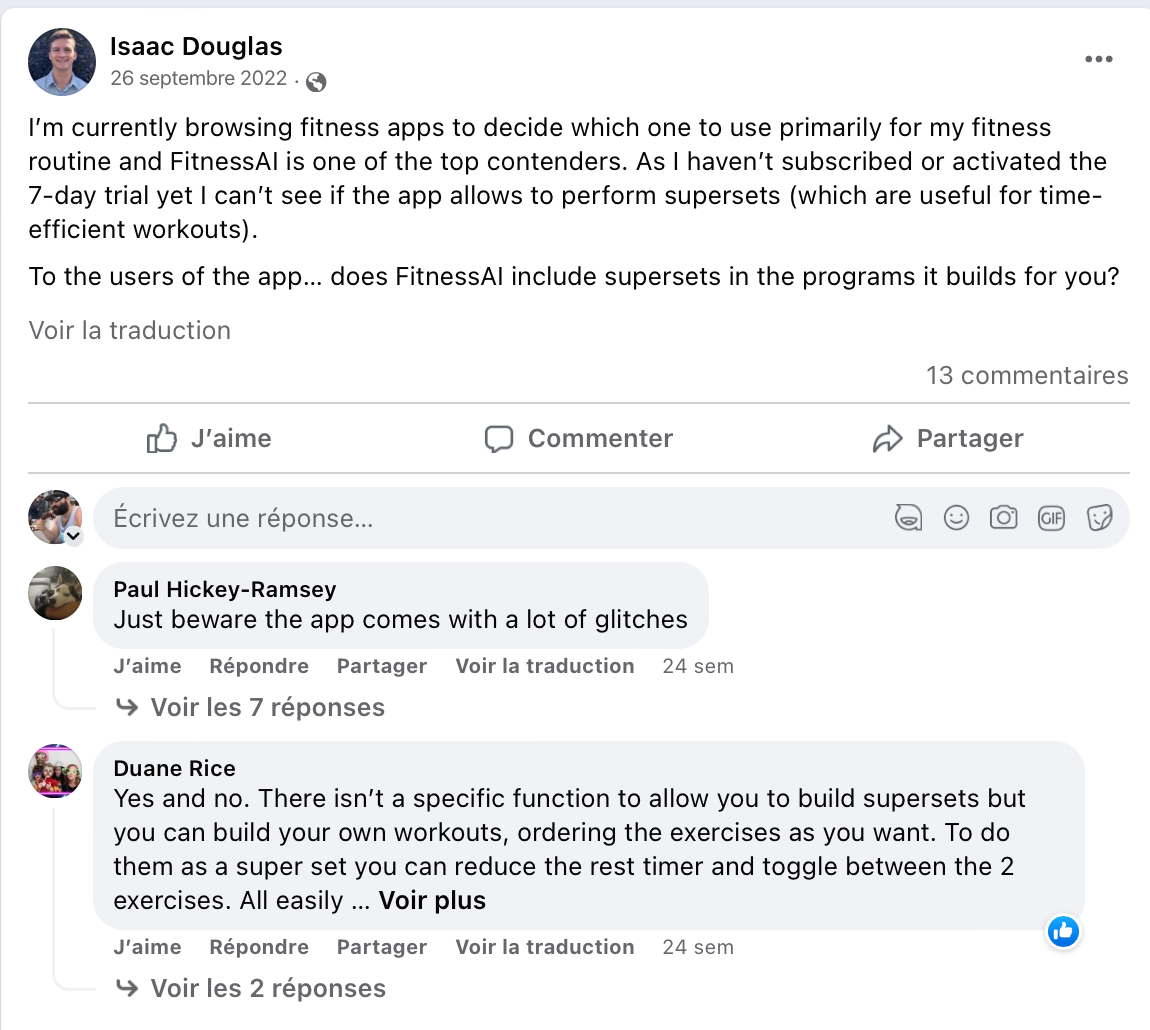
Why Fitness AI may not be for you
Our expert eye sees Fitness AI as more of a fancy gym log than a good tool for generating workouts. If you're looking for a workout app that provides personalized plans and expert guidance, Fitness AI may not be the best fit.
Fitness AI's reliance on toggle option menus, pre-determined settings and other user data means that the app will never create a personalized workout for you. While the app may be useful for tracking progress and logging workouts, it may not be the best choice for users looking for customized plans that take their individual needs and fitness level into account.
If you're just getting started with working out or have under five years of effective experience, it's better to follow a plan made by experts who know what they're doing. Fitness AI doesn't provide the same level of personalized guidance of a well-crafted workout plan developed by experts in the field.
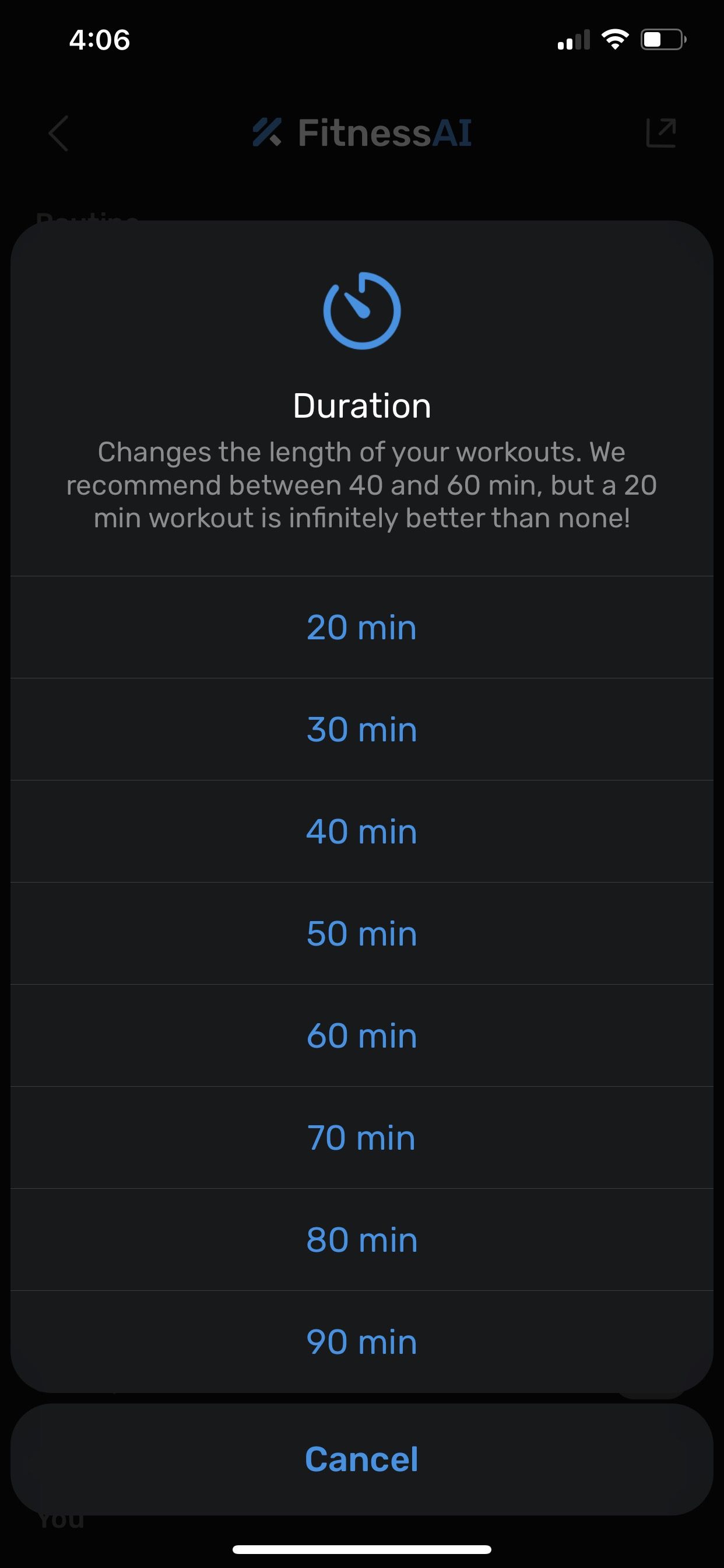
A better alternative to Fitness AI
If you're looking for a workout app that provides personalized plans and expert guidance, Dr. Muscle may be the perfect fit for you. Our app takes all the guesswork out of figuring out what's best for you and replaces the need for a live trainer.
With Dr. Muscle, you'll have access to a PhD-level trainer who can answer any questions you have about your workouts, nutrition, and overall fitness goals. Our app is designed to provide customized plans that take your individual needs and fitness level into account, ensuring that you get the most effective and efficient workouts possible.
Whether you're a beginner or an experienced bodybuilder, Dr. Muscle is the perfect workout app to help you achieve your fitness goals. With our expert guidance and personalized plans, you can be confident that you're getting the best possible workouts for your unique needs and goals. So why settle for a generic workout app when you can have the best?
Why Dr. Muscle is the best workout app
Dr. Muscle is the perfect workout app for anyone looking for personalized plans and expert guidance. Created by a 20-year experienced trainer with a PhD in Public Health. In fact, it would take an experienced human coach about an hour to make the calculations that Dr. Muscle does to create its workouts.
Dr. Muscle applies the following principles to create personalized workouts for its users:
- Progressive overload
- Specificity
- Recovery
- Consistency
- Variation
- Individualization
- Specific time under tension
- Frequency
- Intensity
- Volume
- Specific exercise selection
- Periodization
- And many more
Following these principles is critical to achieving your fitness goals. Progressive overload ensures that you're continuously challenging your muscles to grow and adapt. Specificity ensures that you're targeting the specific muscles and movements you want to improve. Recovery is crucial for allowing your muscles to repair and grow. Consistency ensures that you're making progress over time. Variation helps prevent plateaus and boredom. Individualization ensures that your workouts are tailored to your unique needs and goals. Specific time under tension is important for optimizing muscle growth. Frequency, intensity, volume, and exercise selection are all critical factors that must be optimized for maximum results. Finally, periodization ensures that your workouts are structured in a way that allows for consistent progress over time.
Dr. Muscle takes all of these principles into account when creating personalized workouts for its users. With Dr. Muscle, you can be confident that you're getting the best possible workouts for your unique needs and goals.
Try Dr. Muscle today, it's free.
FAQ
Is Fitness AI the best workout app?
While fitness ai may work for some users, it is not the best workout app for everyone. As we have discussed in this article, it may not be suitable for people who are looking for a workout generator or those who are just starting with their fitness journey.
Is there a better app than Fitness AI?
Yes, there is a better app, dr. Muscle, which we have introduced in this article. Dr. Muscle takes the load of figuring out what is best for you and provides access to a PhD-level trainer to ask questions. It also applies important principles such as progressive overload, specificity, recovery, and individualization, making it a better alternative to fitness ai.
How much does Fitness AI cost?
Fitness AI is priced at $89 per year.
Who is Fitness AI best for?
Fitness AI can be a good choice for people looking for a fancy gym log to keep track of their workouts. However, it may not be the best choice for those looking for a workout generator or those who are just starting their fitness journey.
